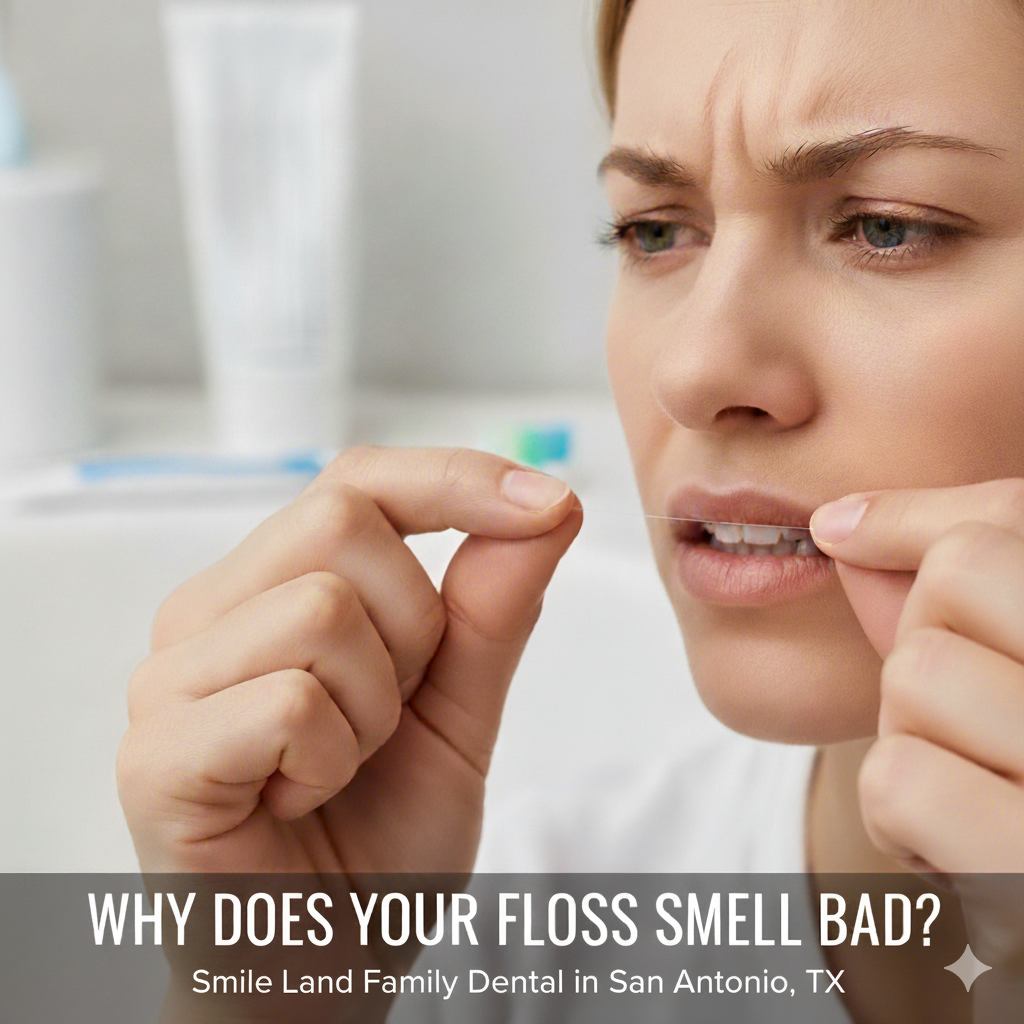Key Takeaways
- A bad smell on your floss is a sign of bacteria, plaque, and food particles being removed from between your teeth.
- Common causes include trapped food, bacterial buildup, gum disease, tooth decay, and dry mouth.
- Flossing daily with proper technique is the most effective way to prevent the smell and improve your oral health.
- If the smell persists despite consistent flossing and hygiene, or is accompanied by bleeding gums, it’s a sign to visit your dentist.
Why Does Your Floss Smell So Bad?
If you notice a foul odor on your dental floss after using it, it’s a strong indication that you’re removing something that doesn’t belong there. That smell is not the floss itself; it’s a mix of odor-producing bacteria, plaque, and decaying food debris that have been sitting between your teeth. While it can be unpleasant, it’s also a good sign that your flossing is working to remove harmful buildup that your toothbrush can’t reach.
The mouth is a complex ecosystem filled with bacteria. When food particles, especially those from proteins and carbohydrates, get stuck between your teeth, these bacteria feed on them. As they break down the food, they release volatile sulfur compounds (VSCs), which are responsible for the rotten, metallic, or sour odor you might notice.
What Are the Main Causes of a Bad Smell When Flossing?
The unpleasant odor on your floss can be caused by several factors, including:
- Trapped Food Particles: Tiny pieces of food can get lodged in the tight spaces between your teeth. If they aren’t removed promptly, they begin to decompose and release a foul smell.
- Bacteria and Plaque Buildup: Plaque is a sticky, colorless film of bacteria that constantly forms on your teeth. If not removed by daily brushing and flossing, it can harden into tartar, which traps more bacteria and releases VSCs.
- Gum Disease (Gingivitis or Periodontitis): The smell can be a key indicator of gum inflammation. When plaque builds up along the gumline, it can cause gingivitis, leading to swollen, red, or bleeding gums. This creates an environment where more bacteria can thrive and produce odors. If left untreated, it can advance to periodontitis, which can cause deep pockets in the gums that collect bacteria and can lead to tooth loss.
- Tooth Decay: Cavities, especially those located between teeth, can create ideal hiding spots for bacteria and decaying food particles. Flossing can disturb this buildup and release the trapped odor.
- Dry Mouth: Saliva plays a crucial role in washing away food particles and neutralizing acids and bacteria. A lack of saliva (dry mouth or xerostomia) can allow bacteria to flourish, leading to a stronger odor when you floss.
What Can I Do if My Floss Smells Bad?
The key to preventing a bad smell on your floss is a consistent and thorough oral hygiene routine.
- Floss Daily: Make flossing a daily habit to prevent plaque and food debris from building up.
- Use Proper Technique: Gently guide the floss between your teeth, avoiding snapping it. Curve the floss into a C-shape against each tooth and clean just beneath the gumline. Use a clean section of floss for each tooth to avoid re-depositing bacteria.
- Brush Twice a Day: Brush your teeth for two minutes, two times a day, to remove surface plaque and food particles.
- Use Mouthwash: An antibacterial mouthwash can help kill any remaining odor-causing bacteria.
It’s also essential to have regular dental cleanings to remove tartar that cannot be removed with at-home care.
Is It Normal for Floss to Smell?
A mild odor on your floss is common and simply means that the floss is doing its job by removing food particles and bacteria. However, a very strong, persistent odor is not normal and is often a sign of an underlying problem, such as gum disease or a hidden cavity.
If the unpleasant smell continues even with a diligent daily flossing routine, or if you also experience bleeding, swelling, or pain in your gums, it’s a good idea to schedule an appointment with your dentist. They can diagnose the root cause and provide professional solutions to get your oral health back on track.

